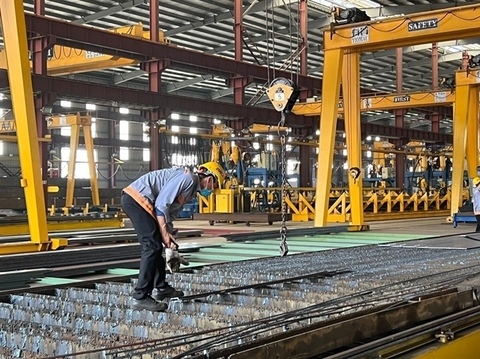Support policies must be practical for firms
Support policies must be practical for firms
Experts have said that the support policies must be practical to ensure accessibility for enterprises.

Mezic Steel Company in Ba Ria - Vung Tau Province. It was necessary to remove obstacles to improve the credit flow. — VNA/VNS Photo Hoang Nhi |
Several support measures introduced recently have proven not as effective as expected.
Recently, the State Bank of Viet Nam proposed the undisbursed part of the 2 per cent interest rate support package, worth up to VND40 trillion, to be transferred into other forms of support.
Statistics showed that only around VND256 billion of the package was disbursed to 1,784 customers as of the end of February. It was forecast that about VND2.57 trillion would be disbursed by the end of this year when the package expired. This would mean that only six per cent of the package was disbursed, leaving a huge sum of more than VND37.4 trillion unspent.
Ha Thu Giang, Director of the Credit Department under the central bank, said that enterprises needed support such as capital sources or tax reduction rather than interest rate support.
The central bank sent the evaluation of the support package to the Ministry of Planning and Investment for consideration of using the undisbursed sum for other forms of support which were more feasible.
Previously, a survey of the Viet Nam Chamber of Commerce and Industry in 2022 found that 29.5 per cent of enterprises heard about the support package but only two per cent received loans from the 2 per cent interest rate support package. More than 56 per cent of enterprises said they faced difficulties when accessing the loans.
Nguyen Xuan Thong, Deputy General Secretary of the Ha Noi Association of Small and Medium-Sized Enterprises, said that the conditions of the loans from the support package presented a significant difficulty to enterprises.
Regarding the proposal of the central bank to transfer the undisbursed sum of the 2 per cent interest rate support package into other forms of support, many experts said this should be the way to go and must be implemented as early as possible.
Pham Xuan Hoe, former Director of Banking Strategy Institute, said it was difficult for enterprises to meet the requirements for the loans, especially in the context that property assets were going down.
The support package should be transformed into funds to provide trust-based guarantees for small and medium-sized enterprises, he said.
Cao Viet Sinh, former Deputy Minister of Planning and Investment, said that the resource from the 2 per cent interest rate support should be used to provide other forms of support such as tax and fee reductions or to accelerate public investment.
Nguyen Quoc Viet, Deputy Director of the Viet Nam Institute for Economic and Policy Research, said if the package could not be changed immediately, it was pressing to remove obstacles which required banks and customers to sit down together to find out problems and solutions, so that the credit flow could be improved.
Another opinion was that the support package should be provided for the development of social housing projects or housing projects for workers, a focus of credit policy to ensure social security.
Statistics showed that Viet Nam would need around VND849.5 trillion to develop more than 1 million apartments for low-income earners by 2030.
























